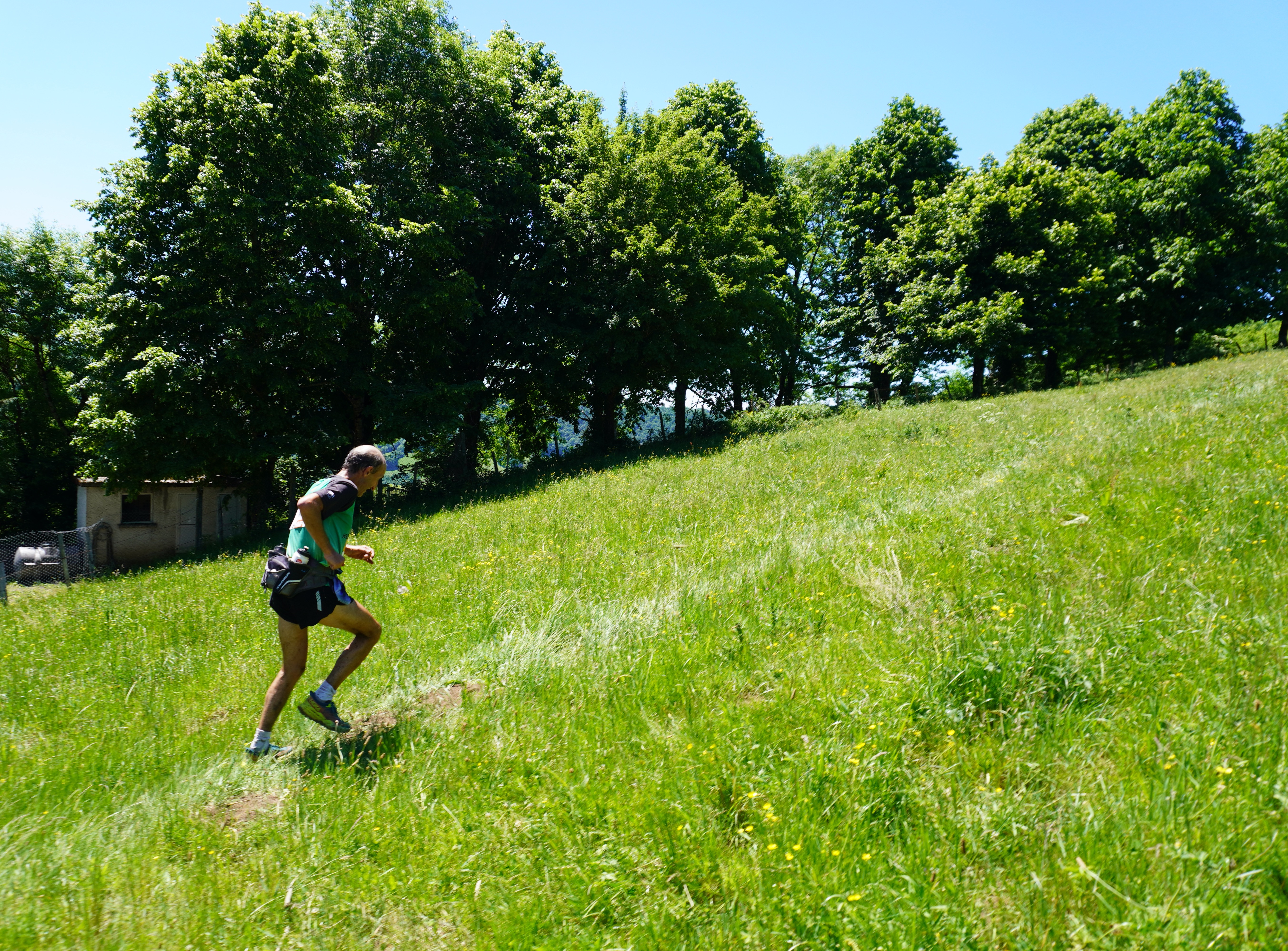What is the Best Way to Run an Ultra Marathon?

Completing an ultra can be an exhilarating experience and give you a massive sense of achievement, especially if it goes well. It can also be very disappointing to have to scratch because despite your great training, you haven't been able to run the race. Whether you are facing your first ultra or you are an ultra veteran it can be worth spending some time thinking about your approach to your race. Here are a few considerations that I go through with all athletes going into an ultra marathon.
Start conservatively
By far the most sensible way to start an ultra event is conservatively. This can be tricky to do after a taper because you will feel fresh and ready to go. It can also be really easy to get carried along by other participants or just generally with the excitement of the race. There will be a lot of people who start off fast and some of those people will just be fitter than you, but some you will pass later. So know what your ultra running effort is, what it feels like and have some objective measures to help you if you struggle with Rate of Perceived Exertion.
Analysis of ultra races shows that the slowest runners slow the most (so set of relatively faster to their overall pace than their faster competitors). In addition to this as the race progresses you are going to feel far better passing people than you are being passed.

Stick to your race plan
In keeping with the above point on starting, stick to a race plan. This of course requires you to have a race plan so do spend time developing this either with your coach, a helpful fellow runner. This is your plan so make sure it is designed for you and you alone (a plan to run with someone else can go wrong if that person is fitter or less fitter than you on the day). A good plan includes:
- Effort/Power/Heart rate max for uphill sections
- Effort/Power/Heart rate for flat sections
- How to approach descents
- When you might want to walk
- Where you will meet your support crew and what they will do for you
- How frequently you will eat and drink
- When to take a nap (if needed)
- When you will have your pacer/support runner
Consume 200-300 calories per hour
Your body needs calories to exercise continuously for long periods of time, it simply cannot store enough muscle glycogen to continue, so you will need to eat. You will hopefully have been training your gut on your long training runs and have your ideal food list ready and available both in your pack, at aid stations and with your support crew with some back up foods in place. It's really easy to forget to eat so having an alarm set on your phone/watch can really help.
If you know that you will struggle to eat towards the end of the race, it can be a good idea to front load a bit by eating more at the start when you are able.
Having a drink with calories in it can also help for the later stages in a race when eating becomes more difficult.
It's usually better to stick to what you know works unless you are desperate, eating and drinking things not tried and tested in training can lead to big gastro problems, the most common reason for quitting a race.
Look after your feet

Your feet are carrying you on the race so look after them. If you feel something rubbing, have an uncomfortable stone/grit in your shoes or develop a hole in your sock with is causing discomfort stop and sort it out; the time price is well worth the avoidance of blisters.
If you do get a blister then stop and sort it (have an emergency blister pack with you in your pack and make sure your support crew is equipped to deal with them also). Having spare socks may also save you.
Stay Positive
Mindset is really important on long events so having ways to stay positive even when things are getting tough is key. At some points you are probably going to feel very tired, very grumpy, sore and you will want to stop...most runners who do stop get back to their base and immediately think they could have and should have continued. Some good ways to stay positive are:
- Make a point of thanking and smiling at every supporter and volunteer
- Mentally thank your body at regular intervals for what it is allowing you to do
- Look around and enjoy the scenery
- Have extra tasty snacks lined up to look forward to
- Remind yourself how lucky and privileged you are to be here doing this fabulous event
- Imagine how great you will feel as you cross the finish line - use a winning image that you have practised.
- Mindfulness - be in the moment rather than worrying about the next stage, be fully present - again something to practise in training.
- Listen to music if you are able and like to do so.
- Focus on parts of your body that do not hurt (this can be done in a humorous way and it still works).
- Imagine yourself telling the story of your adventure to friends and family in a few days time.
Have a Pacer/Support Runner
Having a pacer or support runner/companion can really help keep you going especially in the later stages of a long race. Choose wisely - you want someone who will know what to say, what not to say, where to run (in front, behind, to the side) and who will not treat this as their own individual race.
If you don't have someone official who can do this, chatting to other race participants can help, but remember you may need to let them go ahead if they are going too fast, or you may need to leave them if they are going too slowly.
Have a Support Crew
 Whether you are planning your own ultra adventure or taking part in an organised race a support crew can be invaluable. There are usually points along the way where people are allowed to meet you to cheer you on in formal races. In addition to moral support a support crew can provide.
Whether you are planning your own ultra adventure or taking part in an organised race a support crew can be invaluable. There are usually points along the way where people are allowed to meet you to cheer you on in formal races. In addition to moral support a support crew can provide.
- Extra food and drink so you don't have to carry everything with you
- Warm food/coffee
- Extra clothes (like that extra pair of socks mentioned earlier) so you can be warm and dry
- Just being able to stop and be given food and drink while someone else sorts out your pack makes a big difference.
- Good support crews can also offer advice mid race, tend to blisters or other minor injuries, remind you to eat and help keep you positive.
It does take some extra planning to make sure they know where they need to be and when and what they need to have on hand for you. The planning is definitely worth it and for some non-running friends and family it can be a nice way for them to be involved in your adventure.
Break the Course Down into Sections
Chunking down is a well established way to help you address problems and running ultras is no exception. Breaking down the course into meaningful sections that you can mentally tick off is a big help. Good ways to do this can be to break it down into meeting points and aid stations and marking the points with something of significance (a favourite snack, a verbal reminder, a high five with support crew). My own personal way of chunking down is to count down the climbs, so I have the profile on my watch which shows where I am on it and I can count down the climbs as I check them off. In addition I also treat each stop with my support crew as another stage complete.
I also like to quantify the distances in ways that seem reasonable to my tired body (so breaking down a 24 mile section into increments of 6 miles) or breaking down the last few km of a section into laps of the athletics track (4 laps of the track is 1 mile so 3 miles to go is 12 laps of the track...anyone can run 12 laps of the track!) This is just a trick I use, so trying to find ways of chunking down that are meaningful to you will work best. Some of the advantage of this is that it occupies my mind so I am not thinking about how hard what I am doing is, or how much I hurt, or how much I want to stop!
What Ifs
Before any ultra event I always chat with athletes about the 'what ifs' so that we have a plan for anything that could go wrong. This involves things that may have gone wrong in the past along with any other fears they may have or things we just know could go wrong.
Ultra runs are really long adventures, it would be a miracle if they went without incident so knowing what could go wrong and how you are going to deal with it increases your chances of finishing immeasurably. It's important that your what ifs are individual to you and that the plan to deal with them is too so you know that it will work for you. Good examples of what ifs are:
- Getting lost
- Getting sick and not being able to eat
- Old injuries flaring up
- Falling over
- Getting blisters
- Losing some equipment/food/drink
- Setting off too fast
- Having an emotional crash
- Passing another runner with a medical emergency
- Getting cramp
- I could go on...
Sharing the what ifs with your support crew and pacer/support runner and your plans for dealing with them is a must so you are all on the same page when/if things happen. This includes thinking about and discussing with others when you might need to scratch and when you might just want to scratch and just need some moral support to continue.
If you have a big event coming up and you are not sure how to approach it we'd love to help. Why not book in for a FREE 20 minute 1-1 with Clare to get things started?

March 27, 2023

Comments